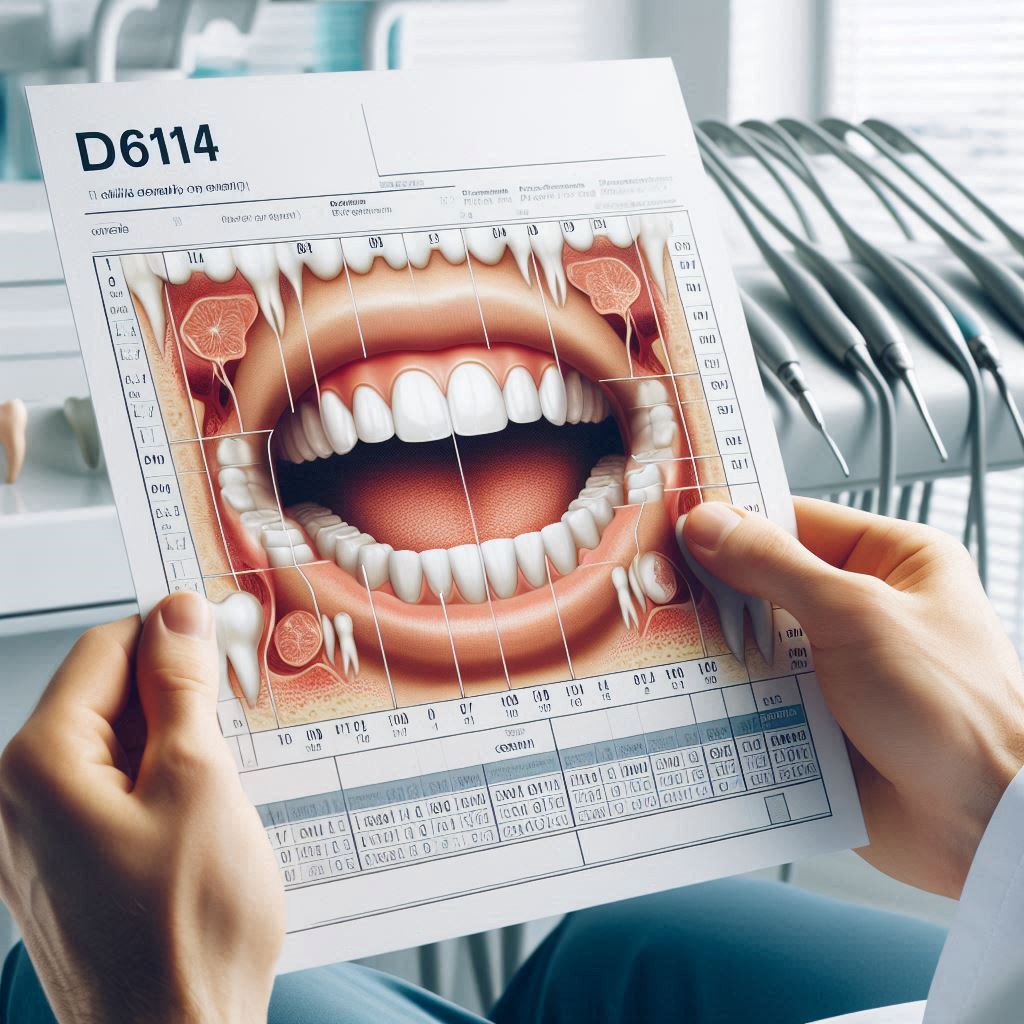D6114 Dental Code
Missing teeth can significantly impact oral health, self-confidence, and overall quality of life. Traditional dentures have long been a solution, but they come with challenges like slipping, discomfort, and bone loss. Enter implant-supported dentures (D6114), a modern dental restoration that combines the stability of implants with the convenience of dentures.
This comprehensive guide explores D6114, the ADA (American Dental Association) code for implant-supported dentures. We’ll cover everything from the procedure and benefits to costs, candidacy, and aftercare. Whether you’re a patient considering this treatment or a dental professional looking for detailed insights, this article provides exclusive, well-researched, and in-depth information.

2. Understanding the D6114 Dental Code
The D6114 code is part of the ADA’s Current Dental Terminology (CDT) and refers to:
“Implant-supported denture for edentulous arch – maxillary (upper jaw) or mandibular (lower jaw).”
This means the code applies to full-arch dentures anchored by dental implants rather than resting on gums.
Key Features of D6114:
- Permanent or removable prosthesis
- Requires 2-6 implants per arch
- More stable than traditional dentures
- Prevents bone loss by stimulating the jawbone
3. What Are Implant-Supported Dentures?
Unlike conventional dentures, which rely on suction or adhesives, implant-supported dentures are secured by titanium posts surgically placed in the jawbone. These implants fuse with the bone (osseointegration), providing a solid foundation for the denture.
Advantages Over Traditional Dentures
| Feature | Traditional Dentures | Implant-Supported Dentures (D6114) |
|---|---|---|
| Stability | May slip or shift | Firmly anchored |
| Bone Preservation | Accelerates bone loss | Prevents bone resorption |
| Chewing Efficiency | Reduced bite force | Near-natural chewing ability |
| Comfort | Can irritate gums | More comfortable, less gum pressure |
| Maintenance | Requires adhesives | More secure, easier to clean |
4. Types of Implant-Supported Dentures
A. Bar-Retained Dentures
- A thin metal bar connects multiple implants.
- The denture clips onto the bar for stability.
- Ideal for patients with moderate bone density.
B. Ball-Retained Dentures (Locator Attachments)
- Each implant has a ball-shaped attachment.
- The denture has sockets that snap onto the balls.
- Easier to remove for cleaning.
5. The D6114 Procedure: Step-by-Step
- Initial Consultation
- Oral exam, X-rays, and 3D scans.
- Assessment of bone density.
- Bone Grafting (If Needed)
- Required if jawbone is too thin.
- Implant Placement
- 2-6 implants are surgically inserted.
- Healing period: 3-6 months for osseointegration.
- Abutment Attachment
- Connectors are placed on the implants.
- Denture Fabrication & Fitting
- Custom dentures are created and secured.
6. Benefits of Implant-Supported Dentures (D6114)
✔ Enhanced stability – No slipping while eating or speaking.
✔ Improved oral health – Prevents bone loss.
✔ Natural appearance – Looks and feels like real teeth.
✔ Long-term durability – Lasts 10-20+ years with proper care.
7. Who Is a Good Candidate for D6114?
✅ Patients missing all teeth in one or both arches.
✅ Those with sufficient jawbone density (or willing to get a bone graft).
✅ Non-smokers (smoking hinders healing).
✅ Individuals seeking a permanent denture solution.
8. Comparing D6114 with Other Dental Implant Codes
| Code | Description |
|---|---|
| D6010 | Surgical placement of a single implant |
| D6110 | Implant-retained denture (fewer implants) |
| D6114 | Full-arch implant-supported denture |
9. Cost of D6114 and Insurance Coverage
- Average Cost: 15,000−15,000−30,000 per arch.
- Insurance Coverage: Some plans cover partial costs (check with provider).
- Financing Options: Many clinics offer payment plans.
10. Potential Risks and Complications
- Infection at the implant site.
- Implant failure (rare, but possible if bone doesn’t fuse properly).
- Nerve damage (if implants are placed incorrectly).
11. Aftercare and Maintenance
- Daily Cleaning: Brush, floss, and use antimicrobial rinses.
- Regular Check-ups: Visit your dentist every 6 months.
- Avoid Hard Foods: Prevent excessive pressure on implants.
12. Frequently Asked Questions (FAQs)
Q1: How long do implant-supported dentures last?
A: With proper care, they can last 15-20 years or longer.
Q2: Does D6114 hurt?
A: Local anesthesia is used during surgery; discomfort is minimal.
Q3: Can I sleep with my implant dentures?
A: Removable types should be taken out at night to clean.
Q4: Are implant dentures better than All-on-4?
A: All-on-4 is a subtype of implant dentures (uses 4 implants per arch).
13. Conclusion
The D6114 dental code represents a life-changing solution for patients with complete tooth loss. Implant-supported dentures offer superior stability, bone preservation, and confidence compared to traditional options. While the cost may be higher, the long-term benefits make it a worthwhile investment. Consult with a qualified dentist to determine if D6114 is right for you.
14. Additional Resources
- American Dental Association (ADA)
- Journal of Prosthetic Dentistry
- National Institute of Dental and Craniofacial Research


